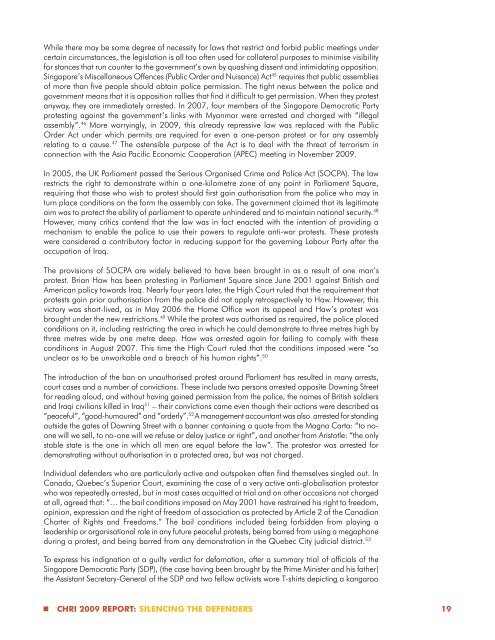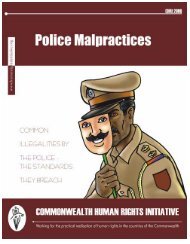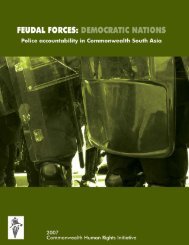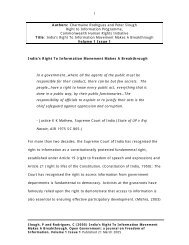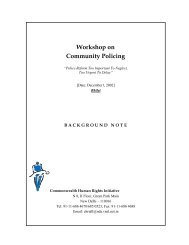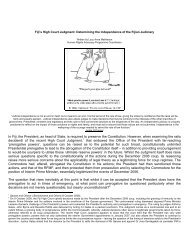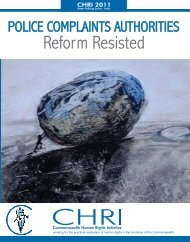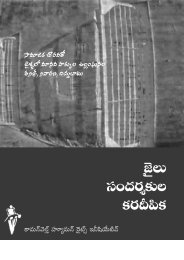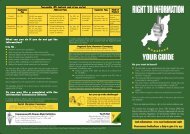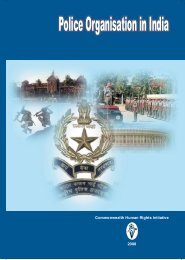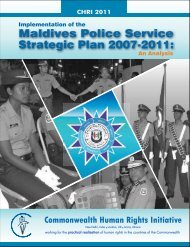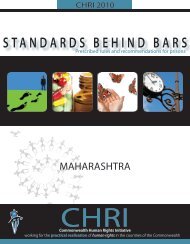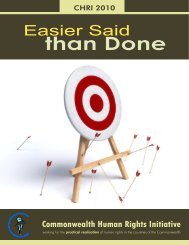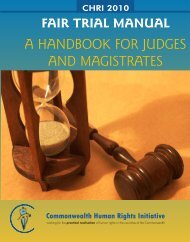Silencing the Defenders - Commonwealth Human Rights Initiative
Silencing the Defenders - Commonwealth Human Rights Initiative
Silencing the Defenders - Commonwealth Human Rights Initiative
Create successful ePaper yourself
Turn your PDF publications into a flip-book with our unique Google optimized e-Paper software.
While <strong>the</strong>re may be some degree of necessity for laws that restrict and forbid public meetings under<br />
certain circumstances, <strong>the</strong> legislation is all too often used for collateral purposes to minimise visibility<br />
for stances that run counter to <strong>the</strong> government’s own by quashing dissent and intimidating opposition.<br />
Singapore’s Miscellaneous Offences (Public Order and Nuisance) Act 45 requires that public assemblies<br />
of more than five people should obtain police permission. The tight nexus between <strong>the</strong> police and<br />
government means that it is opposition rallies that find it difficult to get permission. When <strong>the</strong>y protest<br />
anyway, <strong>the</strong>y are immediately arrested. In 2007, four members of <strong>the</strong> Singapore Democratic Party<br />
protesting against <strong>the</strong> government’s links with Myanmar were arrested and charged with “illegal<br />
assembly”. 46 More worryingly, in 2009, this already repressive law was replaced with <strong>the</strong> Public<br />
Order Act under which permits are required for even a one-person protest or for any assembly<br />
relating to a cause. 47 The ostensible purpose of <strong>the</strong> Act is to deal with <strong>the</strong> threat of terrorism in<br />
connection with <strong>the</strong> Asia Pacific Economic Cooperation (APEC) meeting in November 2009.<br />
In 2005, <strong>the</strong> UK Parliament passed <strong>the</strong> Serious Organised Crime and Police Act (SOCPA). The law<br />
restricts <strong>the</strong> right to demonstrate within a one-kilometre zone of any point in Parliament Square,<br />
requiring that those who wish to protest should first gain authorisation from <strong>the</strong> police who may in<br />
turn place conditions on <strong>the</strong> form <strong>the</strong> assembly can take. The government claimed that its legitimate<br />
aim was to protect <strong>the</strong> ability of parliament to operate unhindered and to maintain national security. 48<br />
However, many critics contend that <strong>the</strong> law was in fact enacted with <strong>the</strong> intention of providing a<br />
mechanism to enable <strong>the</strong> police to use <strong>the</strong>ir powers to regulate anti-war protests. These protests<br />
were considered a contributory factor in reducing support for <strong>the</strong> governing Labour Party after <strong>the</strong><br />
occupation of Iraq.<br />
The provisions of SOCPA are widely believed to have been brought in as a result of one man’s<br />
protest. Brian Haw has been protesting in Parliament Square since June 2001 against British and<br />
American policy towards Iraq. Nearly four years later, <strong>the</strong> High Court ruled that <strong>the</strong> requirement that<br />
protests gain prior authorisation from <strong>the</strong> police did not apply retrospectively to Haw. However, this<br />
victory was short-lived, as in May 2006 <strong>the</strong> Home Office won its appeal and Haw’s protest was<br />
brought under <strong>the</strong> new restrictions. 49 While <strong>the</strong> protest was authorised as required, <strong>the</strong> police placed<br />
conditions on it, including restricting <strong>the</strong> area in which he could demonstrate to three metres high by<br />
three metres wide by one metre deep. Haw was arrested again for failing to comply with <strong>the</strong>se<br />
conditions in August 2007. This time <strong>the</strong> High Court ruled that <strong>the</strong> conditions imposed were “so<br />
unclear as to be unworkable and a breach of his human rights”. 50<br />
The introduction of <strong>the</strong> ban on unauthorised protest around Parliament has resulted in many arrests,<br />
court cases and a number of convictions. These include two persons arrested opposite Downing Street<br />
for reading aloud, and without having gained permission from <strong>the</strong> police, <strong>the</strong> names of British soldiers<br />
and Iraqi civilians killed in Iraq 51 – <strong>the</strong>ir convictions came even though <strong>the</strong>ir actions were described as<br />
“peaceful”, “good-humoured” and “orderly”. 52 A management accountant was also arrested for standing<br />
outside <strong>the</strong> gates of Downing Street with a banner containing a quote from <strong>the</strong> Magna Carta: “to noone<br />
will we sell, to no-one will we refuse or delay justice or right”, and ano<strong>the</strong>r from Aristotle: “<strong>the</strong> only<br />
stable state is <strong>the</strong> one in which all men are equal before <strong>the</strong> law”. The protestor was arrested for<br />
demonstrating without authorisation in a protected area, but was not charged.<br />
Individual defenders who are particularly active and outspoken often find <strong>the</strong>mselves singled out. In<br />
Canada, Quebec’s Superior Court, examining <strong>the</strong> case of a very active anti-globalisation protestor<br />
who was repeatedly arrested, but in most cases acquitted at trial and on o<strong>the</strong>r occasions not charged<br />
at all, agreed that: “… <strong>the</strong> bail conditions imposed on May 2001 have restrained his right to freedom,<br />
opinion, expression and <strong>the</strong> right of freedom of association as protected by Article 2 of <strong>the</strong> Canadian<br />
Charter of <strong>Rights</strong> and Freedoms.” The bail conditions included being forbidden from playing a<br />
leadership or organisational role in any future peaceful protests, being barred from using a megaphone<br />
during a protest, and being barred from any demonstration in <strong>the</strong> Quebec City judicial district. 53<br />
To express his indignation at a guilty verdict for defamation, after a summary trial of officials of <strong>the</strong><br />
Singapore Democratic Party (SDP), (<strong>the</strong> case having been brought by <strong>the</strong> Prime Minister and his fa<strong>the</strong>r)<br />
<strong>the</strong> Assistant Secretary-General of <strong>the</strong> SDP and two fellow activists wore T-shirts depicting a kangaroo<br />
• CHRI 2009 REPORT: SILENCING THE DEFENDERS 19


